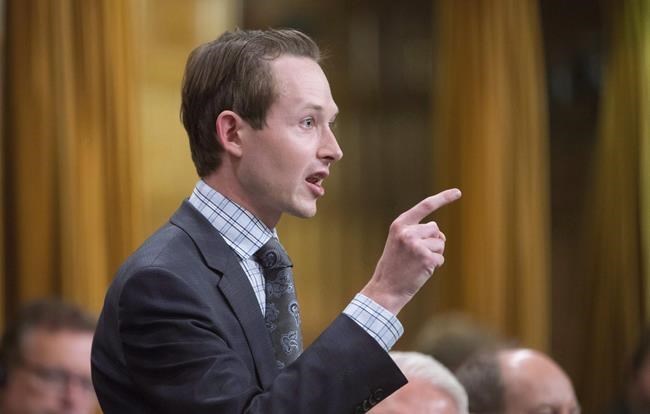OTTAWA — Conservatives are accusing the Trudeau government of rushing recklessly to make it easier for intolerably suffering Canadians to receive medical help to end their lives.
The accusation came Friday as the House of Commons began debating a bill that would amend the law on medical assistance in dying to bring it into compliance with a Quebec court ruling last fall.
That ruling struck down a provision in the law that restricted access to assisted dying to those whose natural death is reasonably foreseeable.
Conservative MP Michael Cooper argued Friday that the government should have appealed the ruling to the Supreme Court rather than trying to rush legislation through Parliament to meet a twice-extended, court-imposed deadline of Dec. 18.
"It need not have been this way, it shouldn't have been this way and it is regrettable that this government has so recklessly put us in this position by rushing through legislation that arguably could put vulnerable Canadians at risk and removes critical safeguards," he told the Commons.
The government first introduced the bill in February but it didn't make it beyond the opening stage in the legislative process before Parliament was adjourned due to the COVID-19 pandemic in mid-March. The bill died when Prime Minister Justin Trudeau prorogued Parliament in August. The government reintroduced it last week.
The bill would scrap reasonably foreseeable death as a requirement for an assisted death but would retain the concept to set out easier eligibility rules for those who are near death and more stringent rules for those who aren't.
For those deemed to be near death, the government is proposing to drop the requirement that a person must wait 10 days after being approved for an assisted death before receiving the procedure. It would also reduce the number of witnesses needed to one from two.
It also proposes to drop the requirement that a person must be able to give consent a second time immediately before receiving the procedure.
People not near death would face higher hurdles.
Such people would face a minimum 90-day period for assessments of their requests for an assisted death. One of the two medical practitioners who assesses a request would have to have expertise in the person’s particular medical condition. And the person would have to be able to give final consent immediately before the assisted death.
The bill would also explicitly ban assisted dying in cases where mental illness is the sole underlying medical condition.
Cooper argued Friday that the bill is "a radical transformation" from the law approved by Parliament just four years ago, which contemplated assisted dying as "an exception to the rule" only for those already nearing the end of their lives.
"With this legislation, it would now be appropriate to terminate human life even in the absence of a terminal illness and even in circumstances where the suffering is medically manageable," he said.
Moreover, Cooper argued that the bill goes "well beyond" what was needed by the Quebec court ruling.
Appealing the court ruling would have given Parliament, which was supposed to begin a legally mandated review of the law in June, the chance to consider the complexities of the issues and would have provided some clarity about the legal framework in which Parliament can legislate, he said.
Bloc Québécois and New Democrat MPs signalled their support for the principles of the bill. But Cooper and other Conservatives complained that the bill does not protect the conscience rights of health-care practitioners who, for moral or religious grounds, refuse to take part in an assisted death or even to refer patients to someone who will.
Bloc Québécois MP Alexis Brunelle-Duceppe suggested the Conservatives' stance is the result of pressure from faith-based lobby groups — a charge Cooper denied.
But the Tories' stance on the bill is consistent with a promise made by Conservative Leader Erin O'Toole, who courted social conservatives during his party's recent leadership contest by vowing to protect the rights of those who refuse to perform or refer patients for services that violate their consciences.
His promise flies in the face of a unanimous Ontario Court of Appeal ruling in May 2019, which said doctors who have moral objections to providing health services like abortion or assisted death must provide patients with an "effective referral" to another doctor.
The law already explicitly says medical practitioners can't be compelled to provide assisted deaths. And Liberal MP Chris Bittle said "no one in the history of this country" has been able to find a single instance in which a doctor has been forced to conduct a medical procedure against their will.
Bittle also bluntly said that the Liberal government, and Parliament, "got it wrong" with the original law on assisted dying, passed in 2016.
He lamented the fact that the government ignored the concerns of experts and Liberal backbenchers, including now Justice Minister David Lametti, who warned at the time that the law was too restrictive and would be struck down as unconstitutional.
"Those voices were ignored and people suffered unnecessarily," Bittle said.
"We need to do better. This legislation is a big step forward … but there's a lot more work that needs to be done."
NDP justice critic Randall Garrison introduced a motion Friday calling on the government to immediately begin the parliamentary review of the law. It is supposed to delve into unresolved issues of whether people should be able to make advance requests for an assisted death and whether eligibility should be expanded to include mature minors and those suffering solely from mental illnesses.
This report by The Canadian Press was first published Oct. 9, 2020.
Joan Bryden, The Canadian Press

